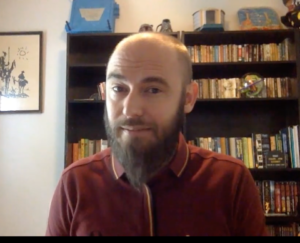 This semester, Elon’s Professional Writing & Rhetoric major welcomes a new assistant professor, Dr. Travis Maynard! Dr. Maynard comes to us from Florida State University, where he completed both his master’s degree (2014) and Ph.D. (2019) in Rhetoric and Composition before spending a year as part of the FSU English Department’s teaching faculty. In addition to teaching, Dr. Maynard has done extensive research on curriculum development and instruction in university writing programs and has presented his findings at academic conferences across the United States. During the 2020 Fall Semester, he will be teaching PWR 217: Professional Writing Technologies, as well as a section of ENG 110. He has also shared a few other bits of information to allow students to get to know him better:
This semester, Elon’s Professional Writing & Rhetoric major welcomes a new assistant professor, Dr. Travis Maynard! Dr. Maynard comes to us from Florida State University, where he completed both his master’s degree (2014) and Ph.D. (2019) in Rhetoric and Composition before spending a year as part of the FSU English Department’s teaching faculty. In addition to teaching, Dr. Maynard has done extensive research on curriculum development and instruction in university writing programs and has presented his findings at academic conferences across the United States. During the 2020 Fall Semester, he will be teaching PWR 217: Professional Writing Technologies, as well as a section of ENG 110. He has also shared a few other bits of information to allow students to get to know him better:
What attracted you to Elon and its PWR program?
I was drawn to Elon and PWR because they both reminded me a lot of my own college experiences. I went to college at Transylvania University, where I was a member of the first graduating class of the university’s Writing, Rhetoric, and Communication major; in that program, I not only benefitted greatly from mentoring relationships with faculty but also realized the importance and value of undergraduate major programs in writing and rhetoric. Based on those experiences, I have known for a long time that I wanted to a) return to a smaller university setting where I could pay it forward by mentoring students and b) teach and research in an undergraduate major in writing and rhetoric. So, I see my new position here at Elon as a realization of both of those goals.
What research topic(s) are you interested in pursuing while at Elon?
I’m very interested in pursuing alumni research while at Elon—specifically alumni of the PWR program and/or the English department as a whole. For my dissertation, I surveyed and interviewed alumni of the Editing, Writing, and Media major at Florida State University, trying to get a sense of the kinds of work that alumni are doing, the kinds of writing they do, and if/how what they learned in the major helps them complete that writing. So, I’d like to refine and replicate that study with alumni of PWR.
What do you hope that students take away from your classes?
If nothing else, I hope that students take away two things. First, the inherently contextual nature of composing: in order to be rhetorically successful, we have to consider our context and audience and make informed rhetorical decisions about which medium and genre will best accomplish our rhetorical ends. Second, the inherently intertextual nature of composing: the idea that no matter what we are composing, we are almost always remixing together pre-existing materials—words, phrases, images, pieces of footage, genres, etc.
What is your favorite thing about teaching writing and rhetoric at the college level?
Really, so many things! I love teaching students new composing technologies, helping them think rhetorically about how to use those technologies, and seeing the end products of their composing. I also really enjoy being able to work with students to help them reach their academic and professional goals, whatever they may be.
Join us in welcoming Dr. Maynard to the Elon PWR faculty!

 Follow
Follow